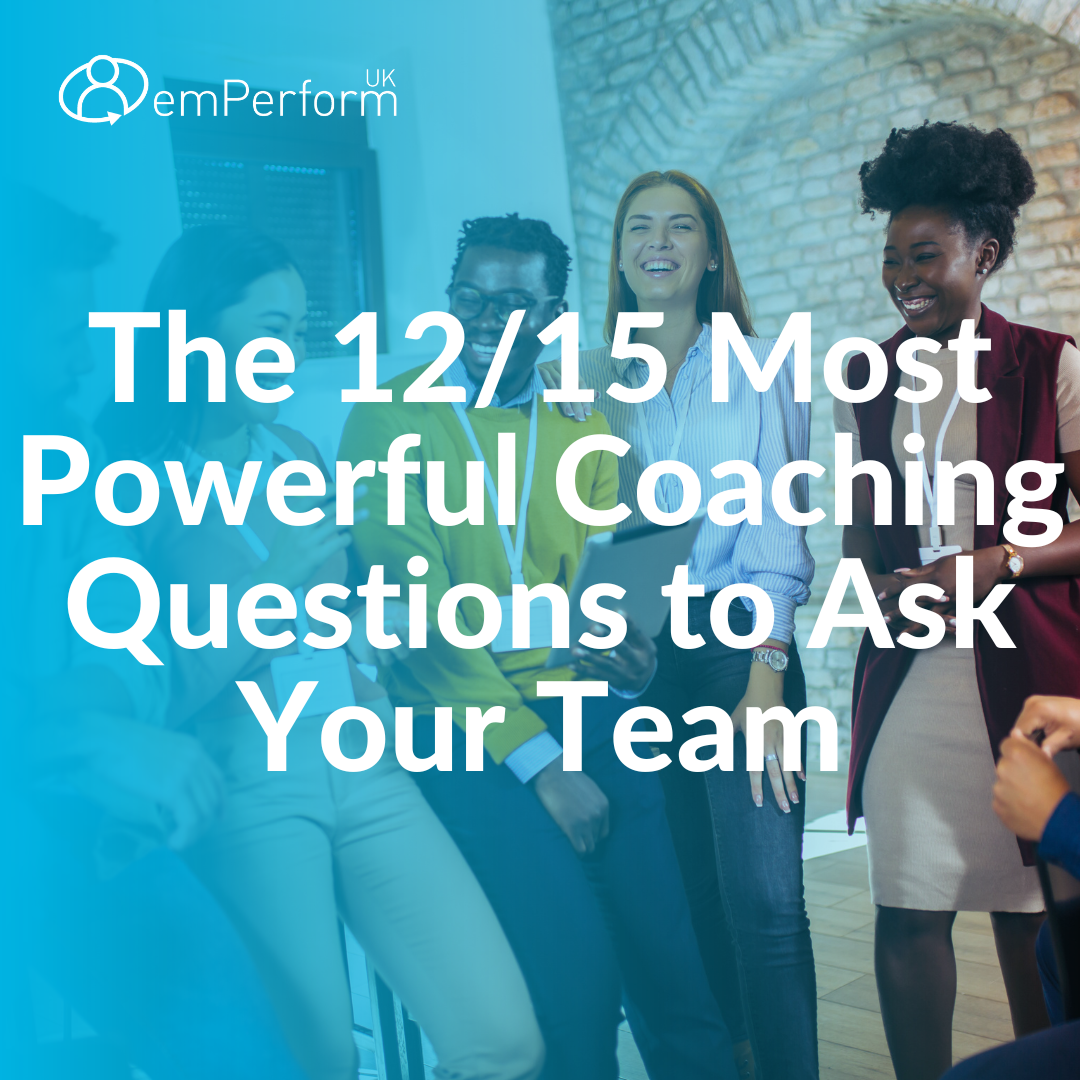
Effective coaching questions are the cornerstone of an organisation’s success. They spark meaningful conversations during one-to-one meetings, performance reviews, and team discussions, promoting a culture of open communication and collaboration. When coaching is approached thoughtfully, it stimulates professional growth, improves employee engagement, and nurtures wellbeing, creating a workforce that’s both happy and highly productive.
Asking the right questions in the right way can uncover insights that lead to positive change within your business. From boosting team morale to improving performance, these questions can have a lasting impact on both individual and team development. By exploring how the delivery of questions and workplace culture intersect, you can unlock numerous opportunities for growth and success across your business. Plus, you’ll gain practical examples to apply immediately, ensuring your team’s potential is fully realised.
Coaching at Work
Meaningful questions motivate employees to take ownership of their professional development so real, positive change can be made. Open-ended questions encourage an exploration of ideas within one-on-one and team-based discussions. Although mentor guidance needs to keep time restrictions and overall SMART goals in mind, leading questions should not restrict detailed and expansive discoveries being shared.
Aim to keep discussions frequent and non-judgemental to create a psychologically safe space where there’s no fear of being embarrassed. 89% of employees who responded to a McKinsey survey said this is essential, so its best for mentors to actively listen and answer questions empathetically to create a positive and supportive learning environment. Effective communication skills cannot be underestimated as a vital part of professional development and employee engagement.
Benefits of Powerful Questions
Tailor coaching questions to specific development areas of your business; performance levels, set goals, employee wellbeing and team collaboration benefit from the discussions these questions produce.
1-Performance Levels
Constructive questions can encourage employees to self-reflect and take charge of their professional growth. Independent conclusions lead to a greater understanding of performance levels, empowering innovative action that smash goals and improve skill sets. Productive behaviour is worth recognising so that employees feel valued and stay engaged. emPerform offers a fantastic compensation management service, taking the headache out of a fair and consistent reward system.
Powerful Coaching Questions:
- “What challenges have you faced achieving this goal? How did you overcome them?”
- “What have you learned from this experience?”
- What accomplishments have you been most proud of recently?
Questions about management, systems and processes encourage upward feedback. This creates a culture of open communication where employee insight can bridge perception gaps and cultivate managerial development. By championing this type of ongoing feedback, continuous learning is universally inspired, improving performance at all levels of the business.
Powerful Coaching Questions:
- “What specific behaviours or actions do you find most helpful/unhelpful?”
- “What aspects of company culture are most helpful/challenging?”
- “What is one thing you’d like to see changed in our company?”
2- Goals
SMART goals set clear targets that offer a shared source of motivation when they are applied correctly. Coaching questions can better clarify end objectives to ensure they are achievable, compelling, and aligned with broader company goals.
Good Coaching Questions:
- “What outcome are you trying to achieve with this goal? Is it achievable?”
- “What resources or support do you need when completing this goal?”
- “How is this goal relevant to you and the company?”
Management coaching can guide the formation of concrete action plans. Company OKRs offer a complementary goal setting framework that re-affirm objectives and identify prospective results. By involving team members in this process, they become motivated to achieve performance outcomes. These measurable goals promote accountability, allowing individual and team progress to be monitored.
Good Coaching Questions:
- “How will you know when this goal has been completed?”
- “What are the key performance indicators when completing this goal?”
- “How will progress be measured? Is success quantitative or qualitative?”
Employee aspirations and progress aims might also be discussed alongside workplace goals. Comparing an individual’s ambitions with their expertise and knowledge identifies upskilling and reskilling opportunities. The necessary support and training should be provided to support professional growth, leading to an 11% increase in profitability and a halved chance of employee attrition (Gallup).
Good Coaching Questions:
- “Tell me something about your current professional goals?”
- “What area of the company/job would you like to learn more about?”
- “What activities are you less confident doing?”
3- Employee Wellbeing
Individuals deserve to feel supported as a valued member of the workforce. DEIB is a crucial initiative for employee wellbeing that stands for Diversity, Equity, Inclusion, and Belonging. ‘Belonging’ is a fundamental component of this approach that prioritises deeper feelings of being accepted and appreciated in an organisation. This creates a positive workplace culture where employees can comfortably express professional opinions and their personal selves. There could be opportunities to discuss whether the workplace atmosphere is inclusive.
Great Coaching Questions:
- “Are there any aspects of our company culture you wish you could change?”
- “What is something we’re not doing as a company that we could be doing?”
- “Do you feel like your contributions are valued?”
One-to-one discussions allow employees to share their perspectives and feel supported professionally and within the broader aspects of their lives. Employee wellbeing should be viewed holistically, with an understanding that the personal and professional spheres are intertwined. Thoughtful questions and active listening cultivate a trusting environment where individuals can privately divulge information about their personal lives. According to CIPD, mental health issues affect one in four people at some in their lives, so having a space where problems can be heard allows the necessary support to be given. These discussions are an excellent opportunity to gain employee insight into true workplace culture, which can be strengthened accordingly.
Great Coaching Questions:
- “How has your week been?”
- “Has there been anything on your mind lately in the office or at home?”
- “You know my door’s always open?”
By boosting job satisfaction and supporting overall employee wellbeing an engaged and productive workforce is created that thrives both in and outside the office.
4. Team dynamics
Your team benefits from being a cohesive unit with a culture of open communication and collaboration at its core. Coaching questions may provide insight into the group’s internal dynamics and how they can be adapted to promote trust and respect. This creates a synergistic workforce with strong interpersonal relationships that can achieve performance outcomes with confidence and efficiency.
Team building activities are an excellent way of strengthening group dynamics. Events like escape rooms and sporting tournaments are a fun way to break down barriers and encourage familiarity between team members. A greater understanding of professional strengths and personal attributes forges smoother workflows, empowering teams to overcome challenges with a 17% higher productivity rate (according to Gallup).
Fantastic Coaching Questions:
- How do you find working with the team?
- Do you feel comfortable giving constructive feedback to your peers?
- What do you think about the communication channels within the group?
- What’s something we can start doing as a team?
Ready to boost team effectiveness, engage your workforce and smash performance outcomes? Powerful coaching questions are a quintessential aspect of employee wellbeing and organisational success. Explore how adding emPerform to your HR Toolkit can help integrate ongoing feedback and performance management to ensure every question is well-informed and crafted for your team’s development.
Book a FREE demo with emPerform today or contact us for any advice on performance management.




Recent Posts